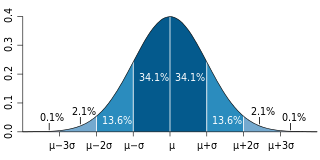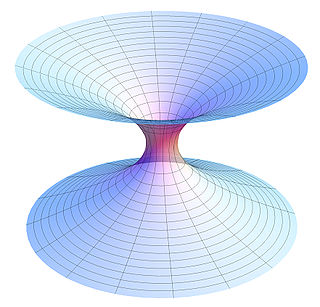
The mind is that which thinks, imagines, remembers, wills, and senses, or in other words is the set of faculties responsible for such phenomena. The mind is also associated with experiencing perception, pleasure and pain, belief, desire, intention, and emotion. The mind can include conscious and non-conscious states as well as sensory and non-sensory experiences.

Physics is the natural science of matter, involving the study of matter, its fundamental constituents, its motion and behavior through space and time, and the related entities of energy and force. Physics is one of the most fundamental scientific disciplines, with its main goal being to understand how the universe behaves. A scientist who specializes in the field of physics is called a physicist.
Reduction, reduced, or reduce may refer to:
A theory is a rational type of abstract thinking about a phenomenon, or the results of such thinking. The process of contemplative and rational thinking is often associated with such processes as observational study or research. Theories may be scientific, belong to a non-scientific discipline, or no discipline at all. Depending on the context, a theory's assertions might, for example, include generalized explanations of how nature works. The word has its roots in ancient Greek, but in modern use it has taken on several related meanings.
Philosophy of science is the branch of philosophy concerned with the foundations, methods, and implications of science. Amongst its central questions are the difference between science and non-science, the reliability of scientific theories, and the ultimate purpose and meaning of science as a human endeavour. Philosophy of science focuses on metaphysical, epistemic and semantic aspects of scientific practice, and overlaps with metaphysics, ontology, logic, and epistemology, for example, when it explores the relationship between science and the concept of truth. Philosophy of science is both a theoretical and empirical discipline, relying on philosophical theorising as well as meta-studies of scientific practice. Ethical issues such as bioethics and scientific misconduct are often considered ethics or science studies rather than the philosophy of science.

Determinism is the philosophical view that all events in the universe, including human decisions and actions, are causally inevitable. Deterministic theories throughout the history of philosophy have developed from diverse and sometimes overlapping motives and considerations. Like eternalism, determinism focuses on particular events rather than the future as a concept. The opposite of determinism is indeterminism, or the view that events are not deterministically caused but rather occur due to chance. Determinism is often contrasted with free will, although some philosophers claim that the two are compatible.

Reductionism is any of several related philosophical ideas regarding the associations between phenomena which can be described in terms of other simpler or more fundamental phenomena. It is also described as an intellectual and philosophical position that interprets a complex system as the sum of its parts.

Phenomenology is the philosophical study of objectivity and reality as subjectively lived and experienced. It seeks to investigate the universal features of consciousness while avoiding assumptions about the external world, aiming to describe phenomena as they appear to the subject, and to explore the meaning and significance of the lived experiences.
A scientific theory is an explanation of an aspect of the natural world and universe that can be repeatedly tested and corroborated in accordance with the scientific method, using accepted protocols of observation, measurement, and evaluation of results. Where possible, some theories are tested under controlled conditions in an experiment. In circumstances not amenable to experimental testing, theories are evaluated through principles of abductive reasoning. Established scientific theories have withstood rigorous scrutiny and embody scientific knowledge.
Experience refers to conscious events in general, more specifically to perceptions, or to the practical knowledge and familiarity that is produced by these processes. Understood as a conscious event in the widest sense, experience involves a subject to which various items are presented. In this sense, seeing a yellow bird on a branch presents the subject with the objects "bird" and "branch", the relation between them and the property "yellow". Unreal items may be included as well, which happens when experiencing hallucinations or dreams. When understood in a more restricted sense, only sensory consciousness counts as experience. In this sense, experience is usually identified with perception and contrasted with other types of conscious events, like thinking or imagining. In a slightly different sense, experience refers not to the conscious events themselves but to the practical knowledge and familiarity they produce. Hence, it is important that direct perceptual contact with the external world is the source of knowledge. So an experienced hiker is someone who has actually lived through many hikes, not someone who merely read many books about hiking. This is associated both with recurrent past acquaintance and the abilities learned through them.
Eliminative materialism is a materialist position in the philosophy of mind. It is the idea that the majority of mental states in folk psychology do not exist. Some supporters of eliminativism argue that no coherent neural basis will be found for many everyday psychological concepts such as belief or desire, since they are poorly defined. The argument is that psychological concepts of behavior and experience should be judged by how well they reduce to the biological level. Other versions entail the nonexistence of conscious mental states such as pain and visual perceptions.

Quantitative research is a research strategy that focuses on quantifying the collection and analysis of data. It is formed from a deductive approach where emphasis is placed on the testing of theory, shaped by empiricist and positivist philosophies.
Philosophy and economics studies topics such as public economics, behavioural economics, rationality, justice, history of economic thought, rational choice, the appraisal of economic outcomes, institutions and processes, the status of highly idealized economic models, the ontology of economic phenomena and the possibilities of acquiring knowledge of them.
The deductive-nomological model of scientific explanation, also known as Hempel's model, the Hempel–Oppenheim model, the Popper–Hempel model, or the covering law model, is a formal view of scientifically answering questions asking, "Why...?". The DN model poses scientific explanation as a deductive structure, one where truth of its premises entails truth of its conclusion, hinged on accurate prediction or postdiction of the phenomenon to be explained.
In philosophy of science, idealization is the process by which scientific models assume facts about the phenomenon being modeled that are strictly false but make models easier to understand or solve. That is, it is determined whether the phenomenon approximates an "ideal case," then the model is applied to make a prediction based on that ideal case.
Antireductionism is the position in science and metaphysics that stands in contrast to reductionism (anti-holism) by advocating that not all properties of a system can be explained in terms of its constituent parts and their interactions.
The Philosophy of mind is a branch of philosophy that deals with the nature of the mind and its relation to the body and the external world.

Alexander Rosenberg is an American philosopher and novelist. He is the R. Taylor Cole Professor of Philosophy at Duke University, well known for contributions to philosophy of biology and philosophy of economics.
The branches of science, also referred to as sciences, scientific fields or scientific disciplines, are commonly divided into three major groups:

Theoretical physics is a branch of physics that employs mathematical models and abstractions of physical objects and systems to rationalize, explain and predict natural phenomena. This is in contrast to experimental physics, which uses experimental tools to probe these phenomena.







